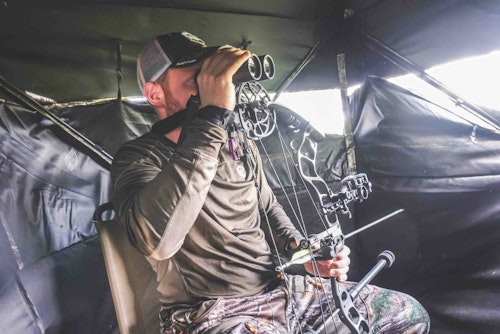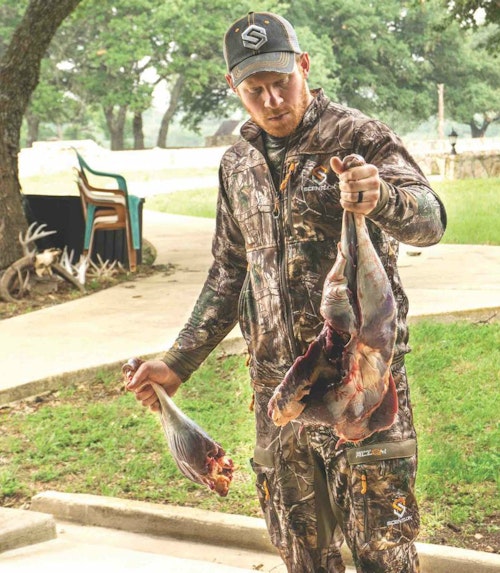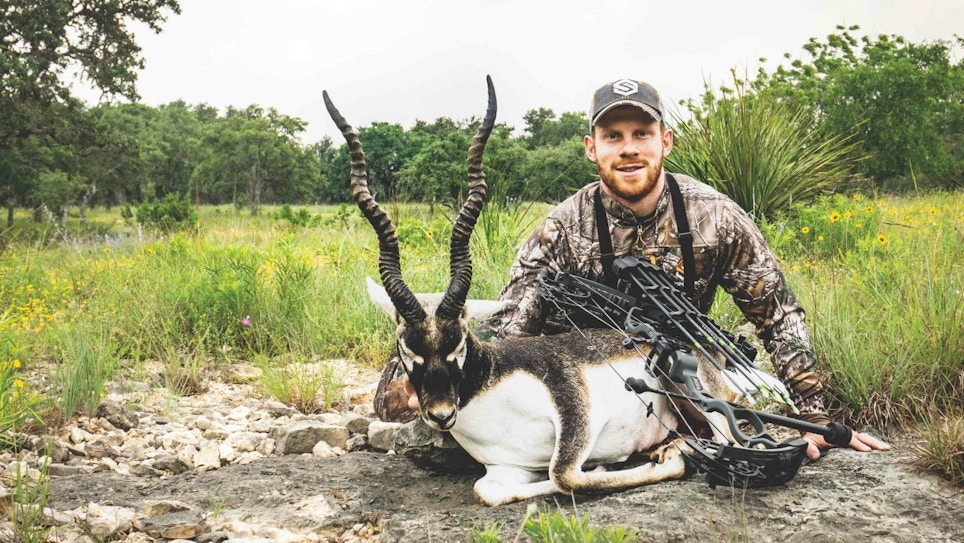I recently wrote a story for Bowhunting World that detailed my first archery adventure for Texas exotics. Click here to check it out. As a follow-up to that feature, I want to offer my opinion on high-fence hunting, and specifically the difference between bowhunting in Texas vs. Africa.
I went into my Texas bowhunt to Lazy CK Ranch in Mountain Home, Texas, expecting guaranteed success with all top-pin shots. It didn’t happen. Our group didn’t meet our harvest quota, and every tagged animal was the result of persistent hunting. Just like 100 percent-fair-chase hunting, animals smelled us and spooked. It wasn’t easy or guaranteed. In fact, one gentleman in our group didn’t take an animal.
Many folks who’ve never hunted a large-acre, high-fence ranch confuse it with pen hunting. But, they’re different. Pen hunts do exist and are conducted on extremely small acreages, where cornering and/or corralling game is done to guarantee shot opportunities. It isn’t hunting. In contrast, I believe high-fence hunting on a large ranch is legitimate after having experienced it.
Would I do it for whitetails? No. Hundreds of opportunities to pursue whitetails across North America on public land give me no reason to. Plus, whitetail genetics are often skewed on high-fenced operations to produce inconceivably huge antlers unrealistic to real-world hunting conditions. Exotics, however, are another matter. You can’t hunt as many different exotic species as I did under non-fenced conditions unless you hunt abroad; therefore, a Texas high-fence hunt is a good option for bowhunters looking to broaden their horizons.
Before you think I’m kooky for saying that high-fence hunting is legitimate hunting, consider this: Our hunt took place on 7,000 acres. Expert black-tailed deer hunters in the Pacific Northwest agree that many mature bucks live their entire life within 80 acres. That means that if you planted a wild black-tailed buck in a 7,000-acre enclosure, he’d live on approximately 1 percent of that enclosure. He’d live and die of old age and never see the fence.
Of course, most high-fence hunting is conducted over feeders. I took my aoudad and rhea from baited locations, while my blackbuck fell to a spot-and-stalk plan. Feeders aren’t for everyone, but they certainly don’t guarantee success like some misconceive. For example, I didn’t encounter a single mature blackbuck from any of the blinds and stands I hunted.
For what it’s worth, I’ve hunted and taken lots of different game species in the wildest of wilds on public land, and even I concluded that high-fence hunting on a large Texas ranch is similar to 100 percent fair-chase hunting.

Texas vs. Africa
Folks looking for a multi-species safari bowhunt often think Africa. Many don’t realize that some African hunting operations, much like my Texas adventure, are high-fence. If you want a truly fair-chase bowhunt for multiple species, Africa is the place, but you must do your research, ask questions and check references to make sure you’re purchasing a 100 percent fair-chase hunt.
In terms of trophy fees, Africa and Texas vary but are somewhat similar. Africa, logistically, is far more complex, and airfare and outfitter fees are more expensive. You’ll obviously need a passport. Travel time is greater. If those and many other complications don’t scare you, then go to Africa.
For me, one of the biggest turnoffs for bowhunting Africa is you cannot bring meat from your harvests back to the United States. Of course, the African people are thrilled to use every scrap, but meat is one of the leading reasons I hunt.
Following my Texas bowhunt, the Lazy CK Ranch carefully delivered my three harvests to a reputable meat-processing facility. The processor did a fine job of processing the meat, and also overnight shipped the frozen meat to my Wisconsin home. Since my Texas trip, my wife and I have been eating incredible meals of rhea, aoudad and blackbuck.
I know that an African safari is an experience all its own, but for someone like me, who eats meat from wild game only, Texas becomes a more attractive option. Plus, it’s logistically simpler and more affordable overall. If the Texas angle interests you, visit www.lazyckranch.com for more information.

Photos by Darron McDougal






